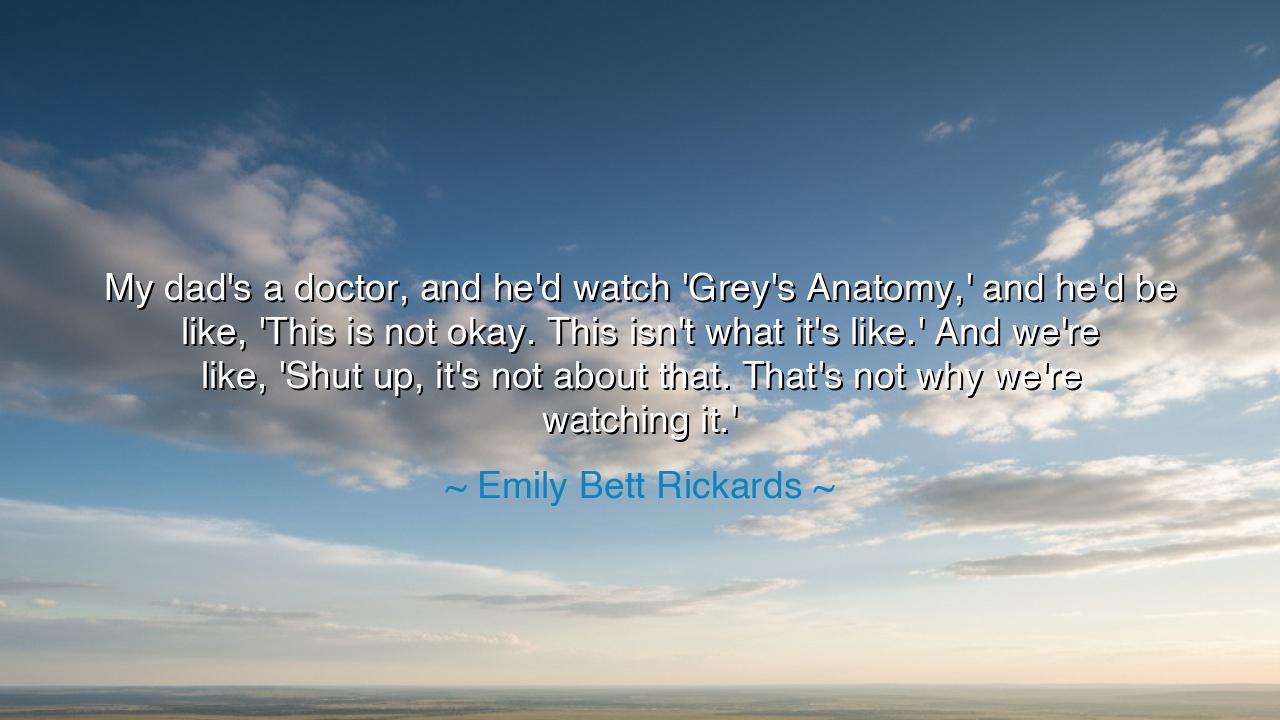
My dad's a doctor, and he'd watch 'Grey's Anatomy,' and he'd be
My dad's a doctor, and he'd watch 'Grey's Anatomy,' and he'd be like, 'This is not okay. This isn't what it's like.' And we're like, 'Shut up, it's not about that. That's not why we're watching it.'






"My dad's a doctor, and he'd watch 'Grey's Anatomy,' and he'd be like, 'This is not okay. This isn't what it's like.' And we're like, 'Shut up, it's not about that. That's not why we're watching it.'" — Emily Bett Rickards
In this lighthearted yet profound reflection, Emily Bett Rickards reveals a truth that reaches far beyond the boundaries of television—it touches the very heart of human nature. Her words, though wrapped in humor, speak to the eternal divide between perception and purpose, between knowledge and imagination. When she recalls her father—a doctor—critiquing the inaccuracies of a medical drama, she reveals a timeless lesson: that sometimes, the beauty of art is not in its accuracy, but in its emotion, its ability to touch the heart rather than imitate the world. For while truth enlightens the mind, story nourishes the soul.
The origin of this quote rests in the contrast between two ways of seeing. The father, bound by his craft and experience, seeks the reflection of reality; the daughter, captivated by narrative, seeks the reflection of humanity. “That’s not why we’re watching it,” she says—and in that playful reply lies a wisdom as old as civilization. For from the earliest myths to the grand epics of the stage, art has never sought to copy life perfectly—it has sought to reveal the heart of life. The healer seeks to cure the body; the storyteller seeks to heal the spirit. Both pursue truth, but in different languages.
This dialogue between the doctor and his daughter is the dialogue between reason and wonder, between those who measure the world and those who feel it. The doctor, with his knowledge of veins and bones, demands precision. He wants the scalpel to be held correctly, the diagnosis to be true. But the artist replies, “That is not the point.” The point is not the surgery, but the struggle, the love, the heartbreak—the pulse of humanity that beats beneath the fiction. Thus, even in jest, Rickards reveals the sacred duality of the human mind: that truth and imagination, logic and emotion, must coexist if we are to understand the fullness of life.
We can see this same tension throughout history. The philosopher Plato once distrusted poets for their distortions of truth, believing that only the rational mind could perceive reality. Yet his own writings are filled with dialogue, metaphor, and myth, for he too knew that logic alone cannot touch the depths of the soul. Centuries later, Leonardo da Vinci bridged this divide—scientist and artist, doctor and dreamer—seeing no contradiction between studying anatomy and painting the human form with divine tenderness. In the meeting of Emily’s father’s realism and her love of story, we glimpse this same eternal conversation: that both precision and poetry are needed to make us whole.
To laugh at her father’s insistence—“This isn’t what it’s like!”—is to laugh at the universal human impulse to critique what we love. It is a reminder that knowledge can sometimes blind us to wonder, that expertise can rob us of awe. The doctor sees the flaws in the fiction; the daughter sees the feeling beneath them. One seeks accuracy; the other seeks meaning. And neither is wrong. The lesson is not that one should triumph over the other, but that both must learn to listen. For wisdom is not found in choosing between truth and imagination—it is found in knowing when to yield to each.
Rickards’s story teaches us to let art be what it is meant to be—a mirror not of reality, but of emotion. It reminds us that in a world obsessed with correctness, we must still make room for beauty, for the imperfect truths that touch our hearts even when they defy reason. When we watch a story, listen to music, or read a tale, we should not ask, “Is this accurate?” but rather, “What does this awaken in me?” For fiction, though false in form, is true in feeling—and through it, we are reminded of what it means to be alive.
So, my child of the future, take this teaching to heart: do not let knowledge silence wonder. When you see the flaws in a story, do not rush to correct them—listen instead for the truth they are trying to tell. Let logic sharpen your mind, but let imagination keep your heart alive. Learn from the doctor’s precision, but also from the artist’s passion. For as Emily Bett Rickards reminds us, not everything we love must be perfect to be meaningful. Sometimes, the purpose of a story is not to show us the world as it is—but to remind us why it is worth living in.






AAdministratorAdministrator
Welcome, honored guests. Please leave a comment, we will respond soon